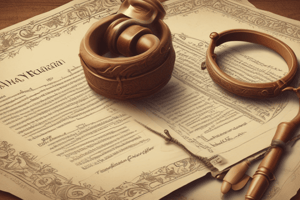Podcast
Questions and Answers
What is the primary focus of criminal law?
What is the primary focus of criminal law?
- Resolving disputes between private parties
- Providing remedies for contract violations
- Examining family matters
- Protecting society and punishing crime (correct)
Who typically bears the burden of proof in civil law cases?
Who typically bears the burden of proof in civil law cases?
- The plaintiff (correct)
- The prosecution
- The accused
- The judge
Which of the following legal consequences is associated with criminal law?
Which of the following legal consequences is associated with criminal law?
- Monetary damages
- Community service (correct)
- Injunctions
- Specific performance
What is meant by the standard of proof being 'beyond a reasonable doubt' in criminal law?
What is meant by the standard of proof being 'beyond a reasonable doubt' in criminal law?
What type of offenses does criminal law deal with?
What type of offenses does criminal law deal with?
In a civil law case, who is typically referred to as the defendant?
In a civil law case, who is typically referred to as the defendant?
What is the aim of resolutions in civil law?
What is the aim of resolutions in civil law?
What distinguishes civil law from criminal law in terms of parties involved?
What distinguishes civil law from criminal law in terms of parties involved?
What is one of the main responsibilities of the judiciary?
What is one of the main responsibilities of the judiciary?
Which of the following reflects the classification of courts in the Nigerian judicial system?
Which of the following reflects the classification of courts in the Nigerian judicial system?
Which factor is NOT mentioned as a fundamental issue regarding judicial independence?
Which factor is NOT mentioned as a fundamental issue regarding judicial independence?
What is considered the apex court in the Nigerian legal system?
What is considered the apex court in the Nigerian legal system?
How are financial allowances for judicial officers in Nigeria typically provided?
How are financial allowances for judicial officers in Nigeria typically provided?
What type of courts are considered inferior courts in Nigeria?
What type of courts are considered inferior courts in Nigeria?
Which statement best represents the state of judicial independence in Nigeria?
Which statement best represents the state of judicial independence in Nigeria?
What indicates the hierarchical structure of the Nigerian court system?
What indicates the hierarchical structure of the Nigerian court system?
What does the audi alterem partem rule emphasize in judicial proceedings?
What does the audi alterem partem rule emphasize in judicial proceedings?
What is the principle of nemo judex in causa sua based on?
What is the principle of nemo judex in causa sua based on?
In criminal proceedings, what is the burden of proof on the accuser?
In criminal proceedings, what is the burden of proof on the accuser?
Which constitutional document guarantees Fundamental Human Rights in Nigeria?
Which constitutional document guarantees Fundamental Human Rights in Nigeria?
What typically characterizes the trial process in both civil and criminal contexts?
What typically characterizes the trial process in both civil and criminal contexts?
What was the outcome of Yesufu Garba's case against the University of Maiduguri due to the chair's interest?
What was the outcome of Yesufu Garba's case against the University of Maiduguri due to the chair's interest?
What must happen for a judge to rule on a case they are involved in?
What must happen for a judge to rule on a case they are involved in?
What issue arises from the multiplicity of laws in Nigeria?
What issue arises from the multiplicity of laws in Nigeria?
Which of the following refers to the portion of English Law that has been retained in Nigerian Law?
Which of the following refers to the portion of English Law that has been retained in Nigerian Law?
What is the significance of Ordinance No. 3 of 1863 in the context of Nigerian Law?
What is the significance of Ordinance No. 3 of 1863 in the context of Nigerian Law?
Which components are included in Received English Law as applicable in Nigeria?
Which components are included in Received English Law as applicable in Nigeria?
Which criteria determines the applicability of English statutes in Nigeria?
Which criteria determines the applicability of English statutes in Nigeria?
What is a primary difference in the application of English law in Nigeria before and after 1960?
What is a primary difference in the application of English law in Nigeria before and after 1960?
Which of the following acts is an example of an English statute currently applied in Nigeria?
Which of the following acts is an example of an English statute currently applied in Nigeria?
Which of the following is NOT a local statute that retained aspects of English Law in Nigeria?
Which of the following is NOT a local statute that retained aspects of English Law in Nigeria?
Which type of English law is applicable without reservations in Nigeria?
Which type of English law is applicable without reservations in Nigeria?
What distinguishes ethnic customary law from other types of customary law?
What distinguishes ethnic customary law from other types of customary law?
Which of the following is a characteristic of Islamic customary law?
Which of the following is a characteristic of Islamic customary law?
What must happen for customary law to be applied in Nigeria under statutory provisions?
What must happen for customary law to be applied in Nigeria under statutory provisions?
What is the main purpose of the validity test for customary law in Nigeria?
What is the main purpose of the validity test for customary law in Nigeria?
Which legal instruments are included in Nigerian legislation?
Which legal instruments are included in Nigerian legislation?
What denotes the nature of Islamic law compared to ethnic customary law?
What denotes the nature of Islamic law compared to ethnic customary law?
Under which condition can customary law be applied without formal requirements in Nigeria?
Under which condition can customary law be applied without formal requirements in Nigeria?
Which statement best reflects the nature of Nigerian legislation?
Which statement best reflects the nature of Nigerian legislation?
Flashcards
Matrimonial Principles
Matrimonial Principles
Guidelines for statutory marriages in Nigeria influenced by English Law.
Judicial Independence
Judicial Independence
Recognition of the judiciary's separation from other government branches since 1960.
Security of Tenure
Security of Tenure
Judicial officers are ensured stable and secure positions to promote independence.
Administrative Independence
Administrative Independence
Signup and view all the flashcards
Financial Security
Financial Security
Signup and view all the flashcards
Supreme Court of Nigeria
Supreme Court of Nigeria
Signup and view all the flashcards
Court of Appeal
Court of Appeal
Signup and view all the flashcards
Inferior Courts
Inferior Courts
Signup and view all the flashcards
Audi Alteram Partem Rule
Audi Alteram Partem Rule
Signup and view all the flashcards
Nemo Judex in Causa Sua
Nemo Judex in Causa Sua
Signup and view all the flashcards
Contentious Trial Process
Contentious Trial Process
Signup and view all the flashcards
Presumption of Innocence
Presumption of Innocence
Signup and view all the flashcards
Fundamental Human Rights
Fundamental Human Rights
Signup and view all the flashcards
Multiplicity of Laws
Multiplicity of Laws
Signup and view all the flashcards
Criminal Law Purpose
Criminal Law Purpose
Signup and view all the flashcards
Civil Law Purpose
Civil Law Purpose
Signup and view all the flashcards
Burden of Proof (Criminal)
Burden of Proof (Criminal)
Signup and view all the flashcards
Burden of Proof (Civil)
Burden of Proof (Civil)
Signup and view all the flashcards
Nature of Criminal Offenses
Nature of Criminal Offenses
Signup and view all the flashcards
Nature of Civil Offenses
Nature of Civil Offenses
Signup and view all the flashcards
Legal Consequences (Criminal)
Legal Consequences (Criminal)
Signup and view all the flashcards
Legal Consequences (Civil)
Legal Consequences (Civil)
Signup and view all the flashcards
Received English Law
Received English Law
Signup and view all the flashcards
Customary Law
Customary Law
Signup and view all the flashcards
Ethnic Customary Law
Ethnic Customary Law
Signup and view all the flashcards
Islamic Customary Law
Islamic Customary Law
Signup and view all the flashcards
Nigerian Legislation
Nigerian Legislation
Signup and view all the flashcards
Types of Legal Instruments
Types of Legal Instruments
Signup and view all the flashcards
Delegated Legislation
Delegated Legislation
Signup and view all the flashcards
Study Notes
Matrimonial Principles
- Matrimonial principles for statutory marriages in Nigeria are influenced by English Law, similar to contract and commercial law.
Independence of the Judiciary
- Since 1960, the Nigerian judiciary is recognized as separate and independent from other government branches.
- The judiciary's primary role is to interpret the law.
- Key aspects of judicial independence:
- Security of Tenure: Judicial officers should have stable and secure positions.
- Administrative Independence: Judicial officers nominated by the government impact independence.
- Financial Security: Judicial officers' salaries are funded by the executive.
- Overall, the judiciary has considerable independence but is not completely free from government influence.
Hierarchical Court System
- Nigeria has a structured court system arranged hierarchically in a pyramid formation.
- The Supreme Court of Nigeria is the apex court and final court of resort.
- The Court of Appeal handles appeals from middle courts, including:
- High Court (federal and state)
- Sharia Court of Appeal
- Customary Court of Appeal
- Inferior courts include:
- Magistrate Courts
- District Courts
- Area Courts
- Sharia Courts
- Customary Courts
Legal Principles in Judicial Conduct
- Audi Alteram Partem Rule: Every individual must be given the chance to be heard before a decision is made.
- Nemo Judex in Causa Sua: No one should preside over a case where they have a personal interest to avoid bias.
Contentious Trial Process
- Trials in both civil and criminal contexts are adversarial and contentious.
- Lawyers represent parties, and the judge evaluates arguments based on established facts.
- In criminal cases, the accused is presumed innocent until proven guilty, with the burden of proof on the accuser.
Protection of Fundamental Human Rights
- Fundamental Human Rights are enshrined in the Nigerian Constitution since 1960, particularly in Chapter IV (Sections 33 to 44 of the 1999 Constitution).
Multiplicity of Laws
- Nigeria operates under multiple legal systems, including both criminal and civil law.
Differences Between Criminal Law and Civil Law
- Purpose: Criminal law maintains public order; civil law resolves disputes.
- Parties Involved: Criminal law involves the state vs. the accused; civil law involves private parties.
- Burden of Proof: In criminal law, the prosecution must prove guilt beyond reasonable doubt; in civil law, the plaintiff must prove the case by a preponderance of evidence.
- Nature of Offenses: Criminal law addresses societal offenses; civil law addresses individual disputes.
- Legal Consequences: Criminal convictions may lead to imprisonment or fines; civil law generally results in remedies or compensation.
- Standard of Proof: Criminal law requires proof beyond reasonable doubt; civil law requires a balance of probabilities.
Received English Law
- English law influences Nigerian law, specifically:
- Common Law
- Doctrines of Equity
- Statutes of General Application as of January 1, 1900
- Only statutes enacted before this date are considered applicable in Nigeria.
Customary Law
- Ethnic Customary Law: Reflects indigenous customs, typically unwritten and flexible.
- Islamic Customary Law: Based on religious texts with strict, written sources.
- Both categories of customary law are recognized under statutory provisions but are subject to validity tests for legal application.
Nigerian Legislation
- Legislation is the formal process of enacting laws by authorized bodies in Nigeria.
- It includes various legal instruments:
- Ordinances
- Acts
- Decrees
- Edicts
- Laws
- Delegated legislation encompasses subordinate laws created by authority under existing statutes.
Studying That Suits You
Use AI to generate personalized quizzes and flashcards to suit your learning preferences.




